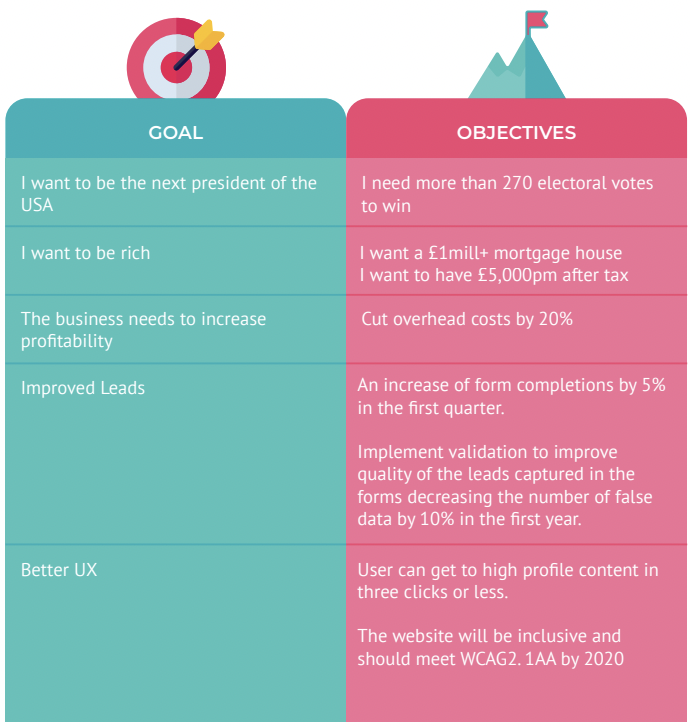The Importance of setting Goals, Objectives, Strategy and Tactics for a Business
Use GOST to help develop and implement strategies
-
01
IntroductionEntrepreneurs and business owners are often guilty of implementing their ideas without proper thought to defining clear objectives and setting out strategies to achieve the objective.
Activities carried out without a clear objective and plan in place increase the chance of failure to achieve the desired outcomes.
In order to improve your chance of success be it in starting or growing your business or, undertaking any activity such as sales and marketing, it is important to set a framework that will establish your goals, set objectives and ensure you have developed strategies and set tactics right from the onset.
In order to achieve the desired outcome, it is important you spend time to ‘think, plan and implement’ and a good way of undertaking this is to use the GOST model.
Remember your present circumstance and position do not determine where you can go; it merely determines where you start from.
To further help you, Acumenology has produced a series of Business Guides on a range of relevant topics.
You can find these at: www.acumenology.co.uk/business-guides
-
02
What is the GOST model?GOST is an acronym that stands for Goals, Objectives, Strategy, Tactics.
It is a very simple and effective way of setting out your desired outcomes (what) and actions to achieve them (how) in a manner that is clear and unambiguous.
When building your GOST model it is important to start from the top with your goal, which is followed by objectives that would lead to the achievement of the goal.
The next step is to determine the strategy which is accompanied by tactics.
While goals and objectives are in reference to ‘what’ in the strategic planning process, strategy and tactics relate to ‘how’ within the process and, in doing so you are moving from the general to the specific
-
03
GoalsGoals and objectives are often confused and used interchangeably.
A goal is a broad outcome, which may take years to reach. It can be short term or long term and is not necessarily tangible. It focuses on what your business wants to achieve and not on how you want to achieve it.
An example might be that your organisation wants to “become a market leader in its field” or “increase profitability.”
Your goal should help clarify the mission you have for your business.
-
04
ObjectivesObjectives and goals are often confused but go hand in hand.
It is a measurable step taken toward reaching the goal. It is specific, actionable and defines progress made toward achieving your goal.
-
05
StrategyA strategy is the plan taken towards achieving the goal by focusing on the how.
It is your plan of action that will help you achieve your goals and objectives and is one of the most crucial aspects of your business operations.
Strategies can define your approach and the right strategy can help you outsmart your competitors.
A lack of a suitable and cohesive strategy can often be a significant contributor to the downfall of a business.
The high street is littered with businesses that failed to change their strategy quickly enough to changing market conditions and new consumer buying behaviour.
-
06
TacticsTactics are specific short-term actions you need to take to achieve the goals associated with a strategy.
The most commonly perceived difference between strategy and tactics is that strategy is long term while tactics is short term.
While a strategy deals with the long-term direction of a business, a tactic takes advantage of opportunities as they happen and deals more with day-to-day matters.
If you have many strategies to be implemented, then you will have different tactics for each. In short tactical planning is a part of strategic planning, and both should work together.
-
07
An exampleYou are a craft brewing company in London
Goals
To be the leading craft beer company in London and the south east
Objectives
To achieve a 35% market share To be ranked as one of the top five tasting craft beers
Strategy
- Add a new dark beer to the company’s lineup
- Expand its current sales territory
- Expand the types of outlets the beer is available in etc
Tactics
- Become guest beer at local pubs and restaurants,
- Make half barrel kegs available for distribution,
- Use buy one get one free sales tactic,
- Offer an introductory discount of 15%
- Print coasters and other point of sales material etc.
-
08
ConclusionYou now know the difference between goals and objectives, strategies and tactics and how they can be used in your business.
Remember the GOST model can be used for the business as a whole, or for a specific activity such as sales or marketing.
A series of other useful Business Guides can be found at: www.acumenology.co.uk/business-guides


